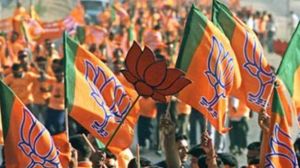Equal Opportunities Commission should benefit all communities: panel
An expert panel set up last year to look into the structure and functions of an 8220;Equal Opportunities Commission8221;...

An expert panel set up last year to look into the structure and functions of an 8220;Equal Opportunities Commission8221;, has recommended that the benefits of the Commission shall be made available to all social groups that feel discriminated and not only to SC/STs, minorities or any other set of pre-defined groups.
The committee, headed by Prof N R Madhava Menon, has also drawn up a broad outline for an Equal Opportunities Bill, 2008, that will address a gamut of issues related to discrimination against various sections of the society.
The committee has already submitted its recommendations to the Centre.
Though the idea to set up the EOC came from the Prime Minister8217;s High Power Committee on the state of Muslims, the EOC envisaged by the expert group is not restricted to SCs, STs, OBCs, Minorities, persons with disabilities or to any other set of pre-defined groups. Instead, the panel has proposed that anybody who feels discriminated, as he/she belongs to a particular social group, should be given access to the Commission.
The committee further says that it is imperative to recognise 8220;social identities,8221; like even staunchly identity-unaware and universalistic states like France and Brazil have done. In fact, recognition of 8220;social identities8221; has been a contentious one and was at the centre of the dispute over the implementation of the Mandal Commission.
The Mandal Commission recognised categories called Other Backward Classes not Castes, something the Supreme Court also endorsed by talking of the need to ensure that the 8220;creamy layer8221; in these communities does not benefit from reservations. All major political parties, the Congress, the BJP and the Left also wanted economic status to be the key factor for determining the degree of backwardness.
However, newer regional caste-based political parties argued for recognising an aspect called 8220;social backwardness8221; by virtue of association to a caste group, and not the level of economic prosperity attained. With the expert group now taking the same line though the Centre is yet to accept the recommendations this is likely to re-kindle the debate on what should be the central basis for determining level of social discrimination. The five-member group also consisted sociologists Javeed Alam, Satish Deshpande, Yogendra Yadav and Gopal Guru.
Meanwhile, the panel has argued for extending the jurisdiction of the Commission to the private sector as well, 8220;as changes in the country8217;s economy in the last two decades have meant that most of the emerging and lucrative opportunities lie in the private sector which has so far remained outside the scope of affirmative action.8221;
What the panel says
8226; It is important to go beyond 8220;purely formal approach8221; to equality
8226; 8216;Deprivation Index8217; should be the key for establishing the Equal Opportunity Commission
8226; Education and employment sectors should be the priority for the panel
8226; A publicly-debated criteria of evidence is needed for establishing equality of opportunity
- 01
- 02
- 03
- 04
- 05































